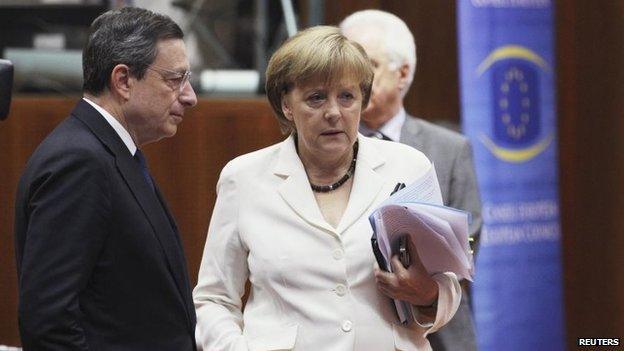Eurozone economy slows further
- Published

Mario Draghi has said the ECB has "stepped up" its plans to act to prop up inflation in the eurozone
The eurozone economy saw anaemic growth in December and suffered its worst quarter for more than a year, a survey has indicated.
The closely watched for December fell to 51.4 from an earlier estimate of 51.7.
But that was better than the previous month's reading of 51.1, which had marked a 16-month low.
The eurozone economy has seen 18 months of continuous, albeit weak growth.
Markit said its latest PMI survey, which combines the results of individual surveys of the construction, services and manufacturing industries, suggested the eurozone economy grew by just 0.1% in the last three months of 2014.
Persistently low inflation since the start of last year has led consumers and business to hold off making purchases or making investments in the expectation that prices will continue to fall.
The problem has been exacerbated since the summer by the falling price of oil. Brent crude has fallen by more than 50% since August to $51.54 per barrel.
The fear of deflation led the European Central Bank (ECB) to lower interest rates to 0.05% and begin an asset purchase programme to inject cash into the economy in August.
However, the ECB has resisted taking the same action as central banks in the US, UK and Japan by buying government debt.
Chris Williamson, chief economist at Markit, said the weakness of the latest PMI surveys would "add to calls for more aggressive central bank stimulus, including full-scale quantitative easing, to be undertaken as soon as possible".
Grexit
He added: "The euro zone will look upon 2014 as a year in which recession was avoided by the narrowest of margins, but the weakness of the survey data suggests there's no guarantee that a renewed downturn will not be seen in 2015."
Analysts expect the ECB to announce its bond-buying programme - also known as quantitative easing - later this month. But some have suggested that technical aspects, such as whether the ECB will buy Greek government debt, may cause delays.
The ECB meeting on 22 January comes three days before a snap election in Greece, caused by the failure of the country's parliament to elect a president and concerns that the country might leave the eurozone.
Greek anti-austerity party Syriza is leading in opinion polls and has pledged to renegotiate the terms of Greece's ā¬240bn bailout from the European Union and International Monetary Fund.
Fears over a possible Greek exit from the eurozone and fears over global economic growth pushed the interest rate on German government debt to new record lows on Tuesday as investors sought safe haven investments.
The yield on German Bunds fell three basis points to an all-time low of 0.484%.
Some members of the ECB's Governing Council have yet to be persuaded of the merits of a bond-buying programme, most notably the president of Germany's Bundesbank, Jens Weidmann.
Inflation for the eurozone in December is widely expected to have fallen and could even be negative for the first time since October 2009. In November inflation was just 0.3%. On Monday, official figures showed that inflation in Germany, the eurozone's largest economy, had fallen to 0.2% in December.
Jennifer McKeown, senior European economist at Capital Economics, said that if inflation were to fall that far, it would "make the pressure for the ECB to implement quantitative easing at its January meeting irresistible".
- Published5 January 2015
- Published4 December 2014
- Published28 November 2014